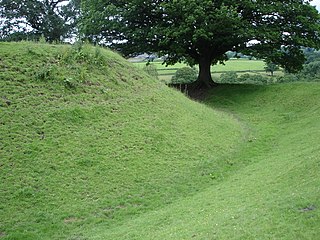
Maelgwn Gwynedd was King of Gwynedd during the early 6th century. Surviving records suggest he held a pre-eminent position among the Brythonic kings in Wales and their allies in the "Old North" along the Scottish coast. Maelgwn was a generous supporter of Christianity, funding the foundation of churches throughout Wales and even far beyond the bounds of his own kingdom. Nonetheless, his principal legacy today is the scathing account of his behavior recorded in De Excidio et Conquestu Britanniae by Gildas, who considered Maelgwn a usurper and reprobate. The son of Cadwallon Lawhir ap Einion and great-grandson of Cunedda, Maelgwn was buried on Ynys Seiriol, off the eastern tip of Anglesey, having died of the "yellow plague"; quite probably the arrival of Plague of Justinian in Britain.

Hu Gadarn is a supposed Welsh legendary figure who appears in several of a series of Welsh Triads produced by the Welsh antiquarian and literary forger Iolo Morganwg. These triads, which Iolo put forth as medieval works, present Hu as a culture hero of the ancient Britons who introduced ploughing. However, it is now known that the triads, like all of the so-called "Third Series" of triads, were fabricated by Iolo himself. The name "Hu Gadarn" earlier appeared in a Welsh translation of a French romance about Charlemagne. Still, Iolo's version of Hu Gadarn was taken up in the 20th century by the poet Robert Graves, who associated him with other Celtic figures; since then he has been popular among neopagans.
A bardic name is a pseudonym used in Wales, Cornwall, or Brittany by poets and other artists, especially those involved in the eisteddfod movement.

Edward Williams, better known by his bardic name Iolo Morganwg, was a Welsh antiquarian, poet and collector. He was seen as an expert collector of Medieval Welsh literature, but it emerged after his death that he had forged several manuscripts, notably some of the Third Series of Welsh Triads. Even so, he had a lasting impact on Welsh culture, notably in founding the secret society known as the Gorsedd, through which Iolo Morganwg successfully co-opted the 18th-century Eisteddfod revival. The philosophy he spread in his forgeries has had an enormous impact upon neo-Druidism. His bardic name is Welsh for "Iolo of Glamorgan".
Edward, Ed or Eddie Williams may refer to:
Awen is a Welsh, Cornish and Breton word for "inspiration".
Iolo Goch was a medieval Welsh bard who composed poems addressed to Owain Glyndŵr, among others.
Celliwig, Kelliwic or Gelliwic is perhaps the earliest named location for the court of King Arthur. It may be translated as 'forest grove'.

Iolo Tudur Williams is a Welsh ornithologist, nature observer, television presenter and author, best known for his BBC and S4C nature programmes, working in both English and his first language of Welsh. After a 14-year career with the RSPB, in 1999 Williams became a full-time TV presenter. He has written a number of books about the natural world.
The Coraniaid are a race of beings from Welsh mythology. They appear in the Middle Welsh prose tale Lludd and Llefelys, which survives in the Mabinogion and inserted into several texts of the Brut y Brenhinedd, a Welsh adaptation of Geoffrey of Monmouth's Historia Regum Britanniae. The Coraniaid figure in the tale as one of three plagues that affect Britain during the reign of King Lludd. They are characterized by a sense of hearing so acute that they can hear any word the wind touches, making action against them impossible.

Iolo Ceredig Jones was a Welsh former international chess player born in Llandysul. He is notable as the co-author of the only Welsh language chess manual, A chwaraei di wyddbwyll?, which he wrote with his father, T. Llew Jones.
Iorwerth is a Welsh name, composed of two elements: iôr meaning 'lord' and berth meaning 'fair', 'fine', or 'handsome'. The name has historically been associated with the name Edward, although the names do not have a common origin and neither name is a translation of the other.
Geraint is a Welsh name derived from the Latin name Gerontius. The original Geraint is a figure of Welsh history and legend. Geraint may also refer to:

Saint Eigen, also spelled Eurgen, Eurgain or Eurgan, was the legendary, and possibly historical first female Christian saint among the Britons. Her name has doubtfully been linked to two Welsh churches and is found in manuscripts from the collection of Iolo Morganwg making historical evidence of her existence dubious and limited.
Taliesin Williams was a Welsh poet and author, and son of the notable Iolo Morganwg.

Barddas is a book of material compiled and written by the Welsh writer Iolo Morganwg. Dressed as an authentic compilation of ancient Welsh bardic and druidic theology and lore. It was posthumously published by John Williams for the Welsh Manuscripts Society in two volumes, in 1862 and 1874.

The Coelbren y Beirdd is a script created in the late eighteenth century by the Welsh antiquarian and literary forger Edward Williams, best known as Iolo Morganwg.
Geraint Huw Jenkins, FBA, FLSW was a historian and academic who specialised in the history of Wales. He was Professor of Welsh History at the Aberystwyth University from 1990 to 1993, when he became Director of the University of Wales Centre for Advanced Welsh and Celtic Studies. In 2009, he retired from academia and was appointed Professor Emeritus of Welsh History at the University of Wales.

"Owain Glyndŵr's Court", also known as "Sycharth" or "The Court of Owain Glyndŵr at Sycharth", is a cywydd by the Welsh bard Iolo Goch. It describes and celebrates the hall and household of his patron, the nobleman Owain Glyndŵr, at Sycharth in Powys. It cannot be dated exactly, but was probably written about 1390, before Glyndŵr's revolt against the English crown. It survives in as many as 24 manuscripts.








